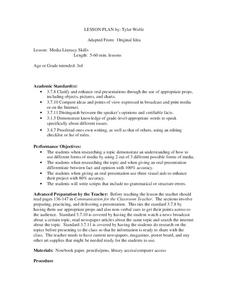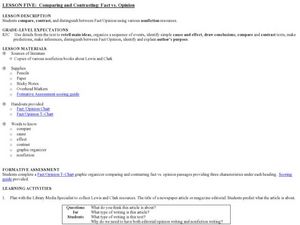Curated OER
Introduce: Fact and Opinion
Build reading comprehension and critical-thinking skills as learners focus on discerning fact from opinion. First, introduce the two terms as you test prior knowledge and explain their meanings (there is a scripted explanation here for...
Curated OER
Build Mastery: Fact and Opinion
Is it a fact or an opinion? Get your kids up and moving during this reading comprehension activity. They listen to you read a book or passage (consider writing something yourself to get the ideal text), listening for facts and opinions....
Curated OER
Fact and Opinion Lesson Plan
How are fact and opinion different? Middle schoolers explore fact and opinion and write articles pertaining to a football match, eliminating all opinion statements in order to focus on the facts. Then they discuss bias in the media....
Curated OER
Facts vs. Opinion (Part 1)
Provide pairs of learners with a three-page Fact vs. Opinion packet. The first page of the packet provides a definition of these terms and an opportunity for guided practice. Partners then share their ideas to complete the practice...
Curated OER
Media Literacy Skills
You're on camera! Third graders find a news story and research it to get more information. Everyone uses their found information to write a script and create their own news broadcast!
Curated OER
Comparing and Contrasting: Fact vs. Opinion
Elementary schoolers investigate nonfiction stories by analyzing facts and opinions. They read nonfiction stories about the Lewis and Clark expedition. Pupils utilize a T-chart to list the facts and opinions on opposite sides, and then...
Curated OER
Mr. Lincoln's Whiskers
Learn about the events that helped shape the United States of America. Elementary schoolers explore the Civil War with six different activities. Each activity has a different focus: literature connections, primary sources, vocabulary,...
Curated OER
Lesson 3: Proving Facts and Forming Opinions
Time for Kids: Butterflies is used to model the process of determining if a text is based on fact or opinion. Children are taught how to skim for key words, and use headings or chapter names to locate proof of whether or not what they...
Curated OER
Fact Versus Opinion
Young learners distinguish statements as fact or fiction. After exploring a newspaper, they determine the type of information it contains. They read editorial articles and discuss the differences between the editorial page and the front...
Curated OER
Veterans Day Fact And Opinion
In this fact and opinion worksheet, students answer 10 questions about the Veterans Day holiday. Students decide if the statements given are facts or opinions.
Curated OER
Reading Comprehension
After listening to a story learners engage in a kinesthetic activity to answer comprehension and critical thinking questions. Finally, the students identify three main facts about the story. Extensions include a fact and opinion...
Curated OER
Fact or Opinion
Have your class differentiate between fact and opinion using this presentation. Learners read a series of statements and identify whether the example is fact or opinion. This is a terrific and motivating way to explore this topic.
Curated OER
Fact and Opinion Project
Explore fact and opinion in the newspaper with your high schoolers. they will read the newspaper and write down specific information they identify as fact and information that is an opinion. Students draw an art project to illustrate...
Curated OER
The Inca Empire: Fact of Opinion
Supplement a lesson on the Inca with this worksheet. Highlighted are 2 image documents which are analyzed to answer 5 fact or opinion questions. Pupils need to provide examples and evidence to support their answers.
Curated OER
Fact of Opinion?
A fact is a true statement and an opinion is what someone thinks, that's what your students will learn when they view this presentation. This resource provides definitions and examples of what facts and opinions are, then tests students...
Curated OER
Electrifying Franklin
Fourth graders research and present information about Benjamin Franklin's life and accomplishments. For this lesson on Benjamin Franklin, 4th graders review idioms and sayings written by Franklin then compare and contrast his various...
Curated OER
School Newspaper
Fifth graders run a school newspaper on a school website and discover how to use various literary forms as they relate to the writing process. In this school newspaper lesson, 5th graders synthesize information from different sources,...
Curated OER
Chalkboard Challenge: Literary Terms
This interactive PowerPoint simulates a "Jeopardy" game that addresses figurative language, cause and effect, and other literary terms. Players can chose which category and amount they would like to play on the Game Board.
Curated OER
Fact and Opinion: How to Tell the Difference
Young scholars explore reasoning by completing a worksheet activity in class. In this fact vs. opinion lesson, students identify the differences between a personal opinion and something that is factually true. Young scholars identify...
Curated OER
Distinguish Fact from Opinion in Passage
Is it a fact or is it an opinion; readers need to know. Second graders learn a new technique to determine if a sentence or reading passage is fact based or opinion based. They read and then ask evidence based questions to determine if...
Curated OER
Fact or Opinion?
In this fact or opinion worksheet, students fill in the graphic organizer with a statement of a fact and their opinions about the fact. Students complete 4 sections.
Curated OER
Animal Facts and Opinions
In this fact and opinion worksheet, students read 20 informative sentences about animals. Students write "fact" or "opinion" for each sentence.
Curated OER
Conventions: Strong Verbs
Fifth graders practice using strong verbs. In this conventions lesson, 5th graders brainstorm words to complete sentences and list lively and exciting verbs. Students act out meanings of certain words. Students come up with new ways to...
Curated OER
Correcting Errors in Sentences
In this proofreading activity, students correct the grammar errors in three sentences. Students tell whether 4 sentences are facts or opinions. Students combine sentences and also write antonyms for 3 words.

























